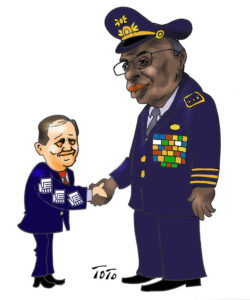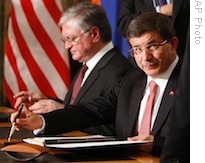ZURICH (AP) — Turkey and Armenia signed a landmark agreement Saturday to establish diplomatic relations and open their sealed border after a century of enmity, as US Secretary of State Hillary Rodham Clinton helped the two sides clear a last-minute snag.
“There were several times when I said to all of the parties involved that this is too important,” Clinton said. “This has to be seen through. We have come too far. All of the work that has gone into the protocols should not be walked away from.”
The Turkish and Armenian foreign ministers signed the accord here after a dispute over the final statements they would make. In the end, the signing took place about three hours later than scheduled and there were no spoken statements.
Clinton and mediators from Switzerland intervened to help broker a solution, US officials said on condition of anonymity, in keeping with State Department regulations. Better ties between Turkey and Armenia have been a priority for President Barack Obama, and Clinton had flown to Switzerland to witness the signing, not help close the deal.
Clinton told reporters traveling later on the plane with her to London that both sides had problems with the other’s prepared statement and that the Armenian foreign minister had to call his president several times.
She said it became important just to approve the accord and not have the sidesmake speeches that could be interpreted as putting legal conditions on the document. She told each country that could be done later, “but let the protocols be the statement because that was what we were there to sign.”









